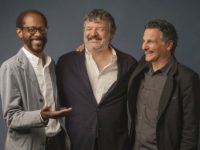There are plenty of highly accomplished jazz drummers over the course of the history of this music, ranging from Max Roach to Jeff “Tain” Watts, but none of these legends of the skins have accomplished what Watts’ contemporary Brian Blade had achieved this past April 21: released an album successfully recasting himself as a credible singer-songwriter.
Truth is, this drummer for such diverse and notable jazzers as Joshua Redman, Bill Frisell, Wayne Shorter and Kenny Garrett as well as folk and rock heroes Joni Mitchell, Bob Dylan and Emmylou Harris, has always been as multifaceted as the roster of leaders he has lent support to. His three albums leading his Fellowship Band introduced Blade as a leader who played down his world-class drumming role in favor of deeply evocative, folkish jazz with a surrounding cast that concentrated on providing heft and texture to his compositions almost to the extent of downplaying improvisation. And yet, even as his Fellowship music stands out within jazz, it’s still very much jazz.
For as long as Blade has been making music, though, he has quietly been composing his own material and recording them, using an acoustic guitar, his voice and a home four-track recorder. When played these tapes to his friend Daniel Lanois, the Canadian producer and musician convinced Blade to finish out the production and put it out as an album. Mama Rosa, named after his grandmother, is the result.
This is a thematic album, built around family, faith and early life events, as well as people he has come to love and admire along the way. Since Blade crafted these songs when he had no intent of releasing them to the public, it’s a thematic album that does not fall into the trap of sounding like the theme was forced. The personal recollections and reflections of Blade is a lot like a personal journal through his upbringing in Shreveport, Louisiana and beyond, set to direct, ethereal music.
So, Blade made a record seemingly opposed to his prior records and all the jazz records by others that he’s appeared on and Mama Rosa is certainly no Fellowship record. At the same time, it should appeal to anyone who likes the Fellowship’s music, because there’s a common thread of haunting spirituality that runs through all of Blade’s records.
“After The Revival” introduces Brian Blade The Folk Singer in impressive enough fashion, with his eloquent, clear and earthbound voice, backed by only his open-tuned acoustic guitar, bass and a tremelo’d guitar. Here, he sings about the upcoming birth of his mother’s first child (Blade’s older brother), beginning the cycle of the narrator’s own life and personal ruminations.
Blade and Lanois provide all the instrumentation for “Mercy Angel,” an affecting song of adoration to a special someone who the narrator draws solace and security. Kelly Jones harmonizes beautifully with Blade’s lead voice.
“At the Centerline” begins with the Serenity Prayer that Blade used to see framed on his Mama Rosa’s wall, before declaring his own revelation from that prayer, “at the centerline we will find our balance.” Meanwhile, Lanois laying down some beautifully aching licks. Fellowship keyboardist Jon Cowherd contributes a pump organ that’s also a familiar part of the Fellowship aesthetic. And Kurt Rosenwinkel from that band joins in on guitar for the second drumless track “Faithful Brother,” which reveals Blade’s ability to write folk songs with a little more harmonic complexity than your average singer-songwriter.
Blade sings effectively in a low octave on “Get There,” and the melody somehow reminds me of early Dan Fogelberg. “Second Home,” a recollection of Blade’s musical education in New Orleans, leans more to the country side of things, topped off by an evocative pedal steel guitar by Greg Liesz.
Most rest of the songs continue along the same slow-to-medium tempo and ecclesiastical topics. Among these latter tracks, “Her Song” (see video below) makes the biggest impression for it’s self-assured softly rocking tribute to the Statue Of Liberty and traditional American values. It doesn’t hurt that the Canadian Lanois is once again contributing some maximal guitar work, either.
There’s also a handful of instrumentals here, but none of them could be considered jazz; “Struggling With That,” “All Gospel Radio” and “Psalms 100” are strictly non-improvisational ambient mood pieces, with the last two being more atmospheric.
Lately, there’s been a lot of buzz over a new Dylan release, and legitimately so. But this self-effacing jazz drummer from the wooded backwaters of northwestern Louisiana deserves some recognition, too. Even with Dylan’s entry, Mama Rosa might end up being the best folk-rock record to come out this year. Daniel Lanois did the listening public a great service in convincing Brian Blade to release his personal recordings. Blade’s old boss Joni Mitchell must be proud of her drummer’s own contribution to the oeuvre of quality rootsy music. And so should anyone else who’s a fan of any of the diverse array of top acts Blade has made his name working for.
- Nick Millevoi – ‘Moon Pulses’ (2024) - April 23, 2024
- Cannonball Adderley – ‘Poppin’ in Paris: Live at L’Olympia 1972′ (2024) - April 20, 2024
- Christian Marien Quartett – ‘How Long Is Now’ (2024) - April 18, 2024



